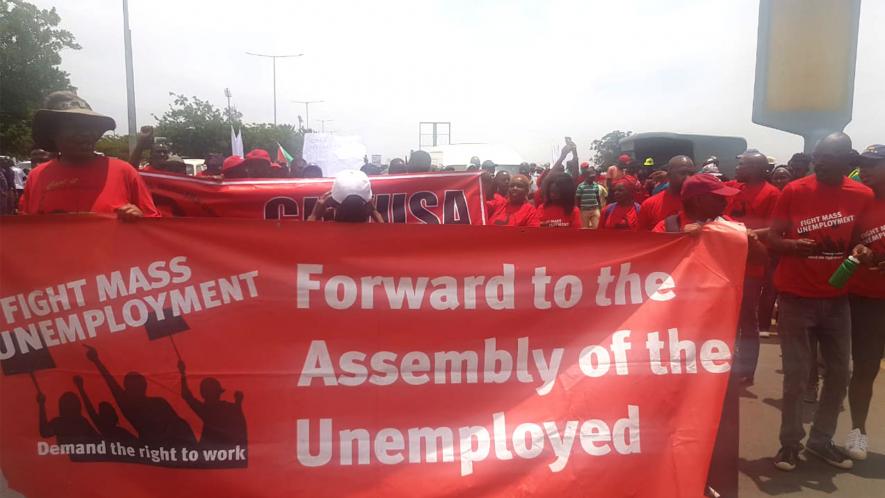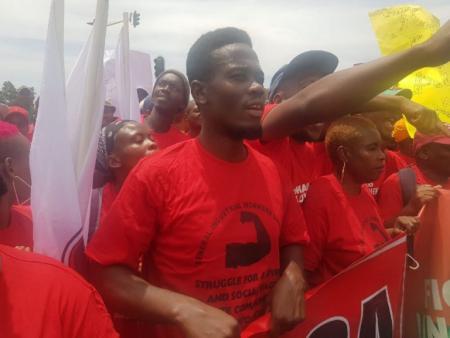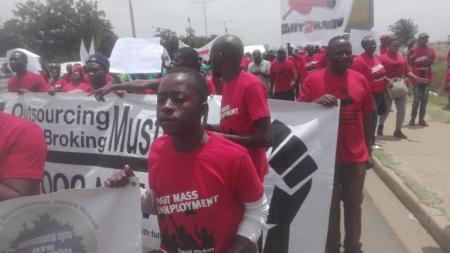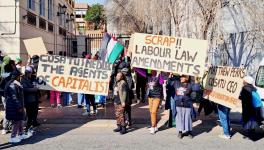South African Unions Call Government’s Investment Summit a Bluff

Trade unions and other organizations striving for socio-economic equality in South Africa marched to the second Investment Summit held in the country on November 7, at the Soweto campus of the University of Johannesburg. Calling the summit a bluff, the organizations condemned the austerity policies of the government, and the blind reliance on Foreign Direct Investment (FDI) for driving economic growth.
The march was led by the South African Federation of Trade Unions (SAFTU) and included National Union of Metalworkers of South Africa (NUMSA), the shack-dwellers movement Abahlali baseMjondolo (AbM), the General Industries Workers Union of South Africa (GIWUSA), the Association of Mineworkers and Construction Union (AMCU), the Unemployed People’s Assembly and several other civil society organizations.
Following the march, a joint memorandum addressed to the country’s president, Cyril Ramaphosa, was submitted on behalf of the 50 organizations, and was received by minister of small business development, Lindiwe Zulu.
As per the memorandum, currently the “investment level.. is around 18% of GDP: way too low to drive growth and economic activity. During the [pre-neoliberal era of] 1970s, in contrast, the rate was 26-32% of GDP.”
It further stated that the investment summit, “once again.. raises false hopes that steps are being taken to address the very low investment levels by both the private sector and the public sector in the economy.”
Meanwhile, the South African government has continued to follow the neo-liberal policies of enforcing austerity while increasing concessions for corporates, in the hope that this will incentivize investments and create jobs. However, the unions claim, data proves that such policies are, in fact, responsible for the current economic crisis.

(Photo: Special arrangement)
Even though the corporate taxes have been halved from 56% to 28% between 1994 – when neo-liberal economic reforms were rolled out on a large scale – and now, this concession has not led to an increase in investments or job creation.
On the contrary, the overall investment levels (measured as a percentage of GDP) have declined, and unemployment in this period has increased from 20% to the current 38.5%. Among the youth – aged 15 to 24 – unemployment level is an alarming 58%.
Arguing that private capital cannot be relied upon for economic growth and job creation, the unions have called for the restoration of corporate tax rate back to the 1994 level of 56%. Additionally, given the high levels of unemployment in the country, along with decreasing real incomes of those employed, the purchasing power of ordinary South Africans is very low, leaving little demand to justify private investments.
According to the unions, in order to revive the economy under the circumstances, the only way forward is to ensure a massive boost in public investment that will improve public infrastructure and provide social security, and also create new jobs leading to an increase in domestic demand.
“South Africa needs a real stimulus package of R500 (USD 33.6) billion to kick start the economy,” the memorandum states. “Government’s own investment is dropping fast, due to Treasury’s extreme cuts in provincial and municipal budgets last week. This must be reversed if there is going to be any hope for this economy.” Instead of expanding public expenditure, the government is taking the opposite direction.

(Photo: Special arrangement)
Unions are also demanding a reduction of the interest rate by 3%, which “will lead to cheaper borrowing, and bolster the household and Small, Micro and Medium Enterprises (SMMEs) expenditure.” They are calling for capital controls and barriers to ensure that profits made in South Africa do not quickly leave the country. This “would immediately improve the disastrous 18% investment level in the economy,” the memorandum states.
Practical measures to end tax-dodging and other forms of illicit cash outflow from the country must also be instituted. It has been speculated that the South African economy loses between R150 (USD 10.08) billion to R370 (USD 24.87) billion annually in this way.
The memorandum further insists that the government bring in mechanisms to “stop leakages and massive fraud linked to its procurement budget,” as Treasury officials estimate that between 30-40% of government’s procurement budget is lost to tender fraud and outsourcing.
Get the latest reports & analysis with people's perspective on Protests, movements & deep analytical videos, discussions of the current affairs in your Telegram app. Subscribe to NewsClick's Telegram channel & get Real-Time updates on stories, as they get published on our website.
























